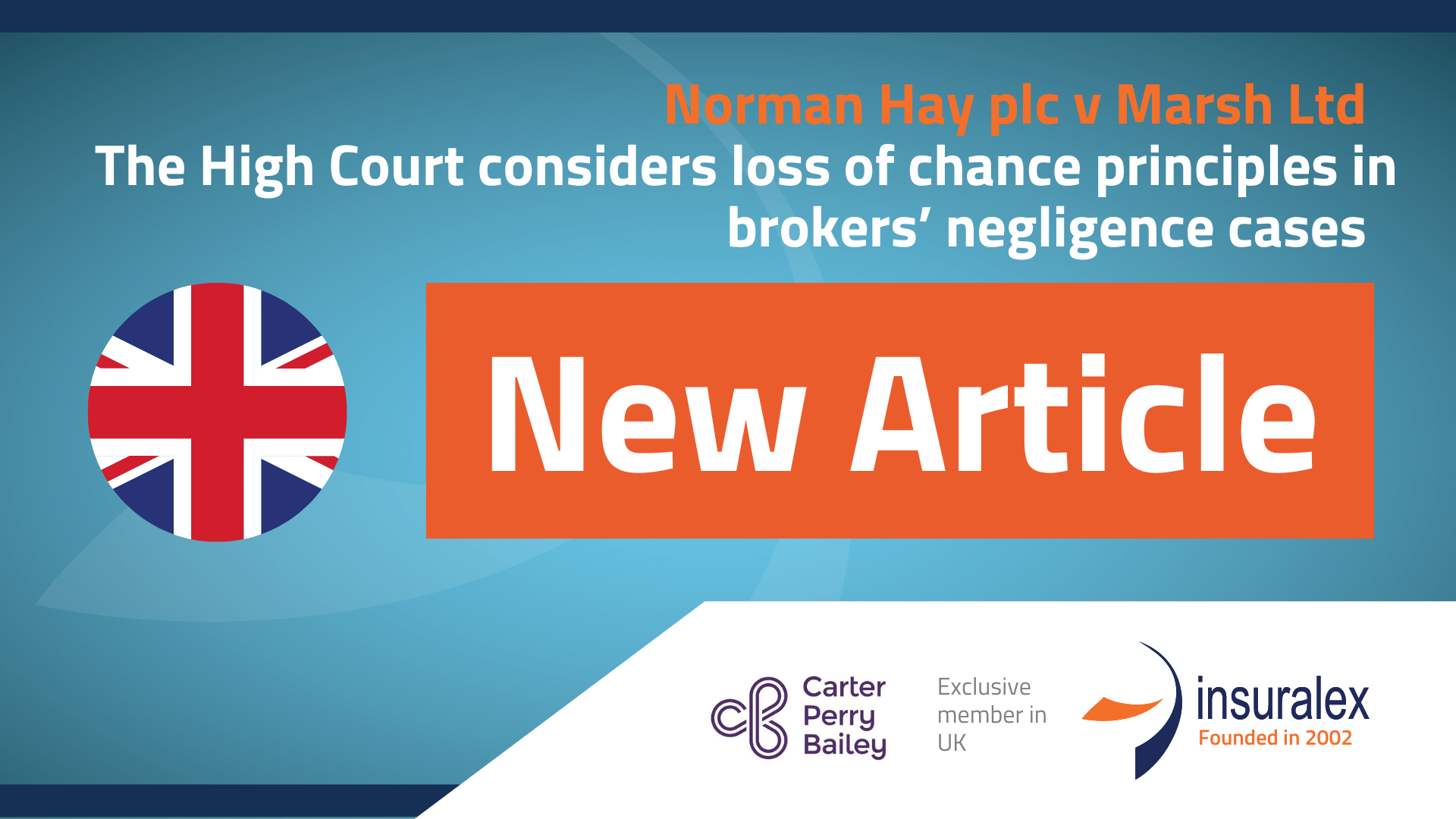
In Norman Hay plc v Marsh Ltd [2024] EWHC 1039 (Comm), in the context of a summary judgment application, the High Court considered the correct approach when determining a claim against insurance brokers in circumstances where it is alleged that, due to the broker’s negligence, the claimant does not have the benefit of liability insurance cover to respond to a claim. In particular, the Court found that a claimant is not required to prove on the balance of probabilities that a putative insurer would have responded. The measure of loss is to be the claimant’s loss of chance to recover under the hypothetical policy.
Background
Norman Hay (“NH”) is a holding company, whose group companies were world leaders in specialist chemicals, sealants and surface coatings. Those companies were located in different jurisdictions throughout the world, and their employees frequently travelled for business purposes.
Marsh was retained by NH as the insurance broker to the companies within the NH group. In that capacity, Marsh placed cover on a country-by-country basis for the policy year 2017/2018 and under a global liability programme for the policy years 2018/2019 and 2019/2020
On 22 November 2018, the morning of Thanksgiving, Mr Nigel Kelsall, said by NH to be an employee of one of NH’s subsidiaries, was involved in a road traffic accident in Ohio, USA, whilst driving a hire car without insurance. Mr Kelsall was tragically killed and Ms Sage, the driver of the other car involved in the accident, was seriously injured.
A claim was commenced against NH by Ms Sage alleging that the crash was caused entirely by the negligence of its employee. The claim was settled for USD 5.5 million. NH was not entitled to be indemnified for the settlement, as it did not have rental motor liability cover as part of the global liability programme.
The Claim against Marsh
A claim was brought by NH against Marsh on the basis that Marsh had allegedly failed to arrange cover which would have indemnified NH in the event of third party liability being incurred by employees driving hire cars in the course of NH’s business. This was denied by Marsh.
Marsh subsequently applied for the claim to be struck out, or summary judgment in its favour, on the grounds that it believed NH had failed, amongst other things, to establish liability towards Ms Sage
Application of the decision in Dalamd
Marsh submitted that, even if there had been insurance cover in place, insurers would have declined an indemnity, as the insured was not liable to Ms Sage. Therefore, a key issue before the Court involved whether it should determine whether NH would have had a valid claim on the hypothetical policy on the balance of probabilities. In this regard, Marsh relied on the previous authority of Dalamd Commercial Ltd v Butterworth Spengler [2018] EWHC 2558 (Comm).
In Dalamd, Mr Justice Butcher considered how causation should be analysed in brokers’ negligence cases where the insured has not pursued the claim against its insurer to settlement, judgment or award. It was held that, to succeed in its claim against the broker, the insured must show that its claim against its insurer would have failed as a result of the broker’s negligence. Thus, the Court had to decide, on the balance of probabilities, whether the insured’s claim against the insurer would have failed.
In response, NH submitted that it was not necessary for NH to show that it was liable in law to Ms Sage and that the putative insurer would have been legally bound to indemnify NH. They argued that the correct legal test to be applied was to assess the likelihood that the putative insurer would have provided an indemnity applying “loss of a chance” principles.
The Decision
Mr Justice Picken ruled that it would not be appropriate either to strike out NH’s claim or to give summary judgment dismissing it.
The case was distinguishable from Dalamd, because the effect of the broker’s alleged negligence was to deprive the client of the opportunity of bringing an insurance claim at all. The case therefore involved the consideration of the counterfactual with a hypothetical policy of insurance. In such circumstances, there is scope for a broader inquiry as to what, had the broker not been negligent, would have happened in the event that the claimant had presented a claim to its putative insurer. That necessarily requires there to be an assessment of the chance that the claim under the putative policy would have been met.
Accordingly, Marsh’s application was dismissed and NH’s claim allowed to proceed
CPB Exclusive Insuralex ‘s member in the UK Comment
As this was an application for summary judgment, Mr Justice Picken’s decision has no binding significance. It reflects the view that NH’s case on causation is arguable
It is suggested that Dalamd may be restricted to cases where a broker is sued in relation to a dispute on an existing policy without an attempt to pursue the insurer. Where a claimant, through the alleged negligence of its broker, has no policy at all, it will be sufficient for a claimant to prove it lost a chance to make a recovery. In the circumstances, if the Court accepts the chance would have been taken by the claimant and the prospects of securing some benefit were “real and substantial” by reference to the doctrine in the Court of Appeal decision of Allied Maples Group Ltd v Simmons and Simmons [1995] 1 W.L.R, then the claimant will make a recovery based on the assessed chance of success.
This may allow claimants to recover where insurers might have fully defended the claim. Conversely, defendant brokers may consider that the loss of chance analysis could reduce the value of a reasonably strong claim.
July 2024
CPB Exclusive Insuralex ‘s member in the UK
Any questions
If you have any questions regarding the issues raised in this article, please get in touch with Dean or Lisbeth.

Dean De CesareSenior Associate |

Lisbeth PoulsenSolicitor / European Qualified Lawyer |



